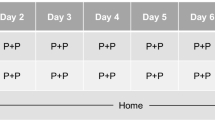Abstract
Questionnaires, motor-skill and cognitive tests were given to 3 groups of 12 healthy young men after administration of either 0,10 or 20 mg of medazepam (Nobrium). Tests were given both before and after experimental intoxication with 1 ml/kg bodyweight of diluted ethanol. On most tests medazepam did not interact with alcohol: no synergistic or antagonistic drug reaction was observed. A greater subjective fatigue rating by the drug groups was not confirmed by objective measures. The use of psychoactive drugs with ambulant patients is discussed and it is concluded that medazepam medication has no detrimental effect on driving ability.
Similar content being viewed by others
References
Bernstein, M. E., Hughes, F. W., Forney, R. B.: The influence of a new chlordiazepoxide analogue on human mental performance. J. clin. Pharmacol. 7, 330–335 (1967)
Forney, R. B., Hughes, F. W.: Combined effects of alcohol and other drugs. Springfield, Ill.: Ch. C. Thomas 1968
General Practitioner Clinical Trials: Medazepam: a new tranquilliser. Practitioner 206, 688–690 (1971)
Kerry, R. J., McDermott, C. M.: Medazepam compared with amylobarbitone in treatment of anxiety. Brit. med. J. 1971I, 151–152
Kibrick, E., Smart, R. G.: Psychotropic drug use and driving risk: a review and analysis. J. Safety Res. 2, 73–85 (1970)
Kielholz, P., Goldberg, L., Im Obersteg, J., Poeldinger, W., Ramseyer, A., Schmid, P.: Fahrversuche zur Frage der BeeintrÄchtigung der Verkehrstüchtigkeit durch Alkohol. Tranquilizer und Hypnotika. Dtsch. med. Wschr. 94, 301–306 (1969)
Landauer, A. A., Milner, G.: Desipramine and imipramine, alone and together with alcohol in relation to driving safety. Pharmakopsychiat. Neuro-Psychopharmak. 4, 265–275 (1971)
Milner, G.: Drugs and driving. Basel: Karger 1972
Milner, G., Landauer, A. A.: Haloperidol and diazepam, alone and together with alcohol, in relation to driving safety. Blutalkohol 10, 247–254 (1973)
Moskowitz, H., Burns, M.: Effects of alcohol on the psychological refractory period. Quart. J. Stud. Alcohol 32, 782–790 (1971)
Myrsten, A. L., Goldberg, L., Neri, A.: Interaction between alcohol and tranquilizing drugs. Reports from the Psychological Laboratories, University of Stockholm, No. 321 (1971)
Silverstone, J. T., Carne, H. J., Cooper, R. M., Dell, A. J., Salkind, M. R.: The controlled evaluation of a new tranquillizing drug medazepam in the treatment of anxiety. Brit. J. clin. Pract. 25, 172–174 (1971)
Thayer, R. E.: Measurement of activation through self-report. Psychol. Rep. 20, 663–678 (1967)
Author information
Authors and Affiliations
Rights and permissions
About this article
Cite this article
Landauer, A.A., Pocock, D.A. & Prott, F.W. The effect of medazepam and alcohol on cognitive and motor skills used in car driving. Psychopharmacologia 37, 159–168 (1974). https://doi.org/10.1007/BF00437422
Received:
Issue Date:
DOI: https://doi.org/10.1007/BF00437422




